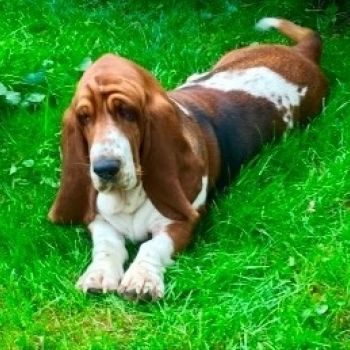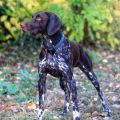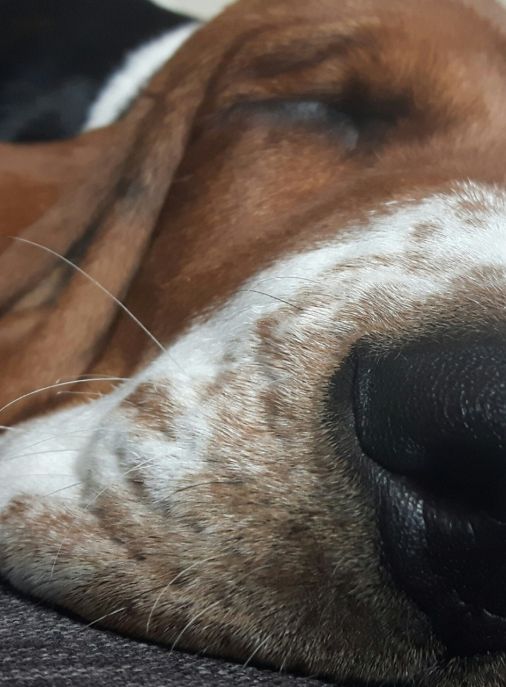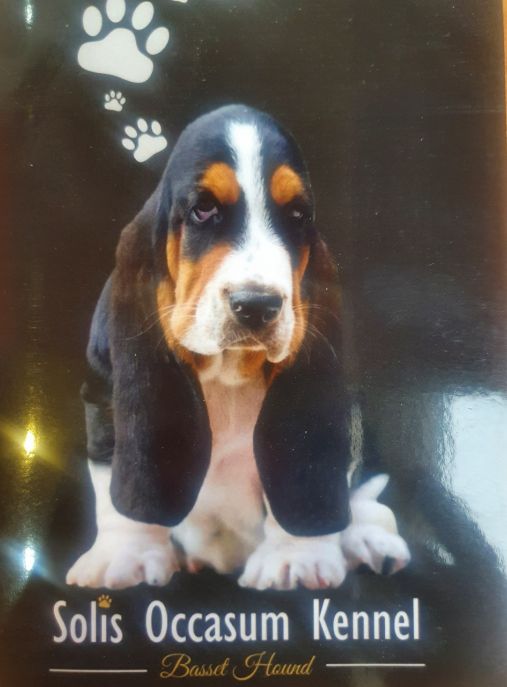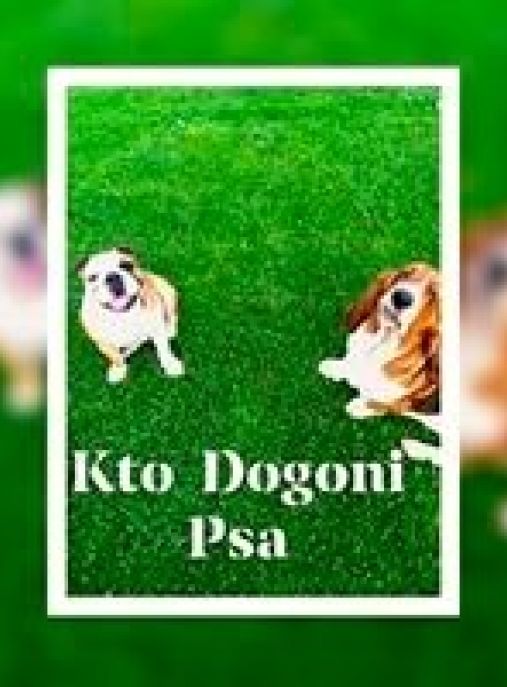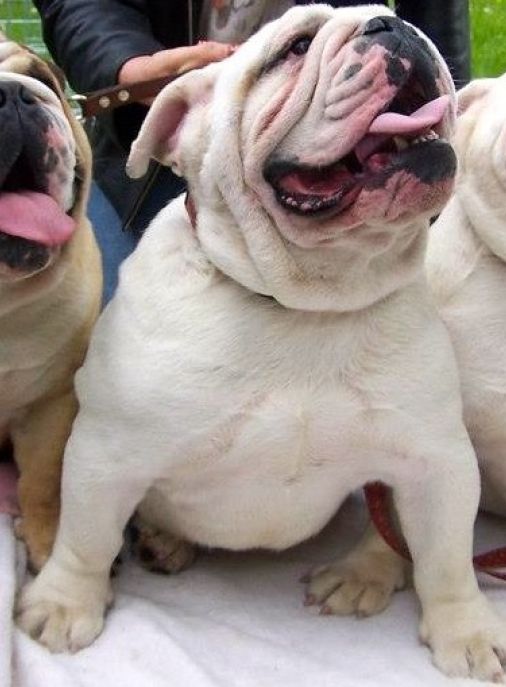The Basset Hound is a unique and distinctive breed known for its long ears, droopy eyes, and low-slung body. With its endearing appearance and gentle nature, this breed has captured the hearts of dog lovers around the world. In this comprehensive description, we will delve into the history, characteristics, and interesting facts about the Basset Hound.
Originating in France, the Basset Hound was developed in the 19th century through selective breeding. The breed was created by crossing the Bloodhound with smaller French scent hounds, resulting in a dog with exceptional scenting abilities and a distinctive appearance. The name "Basset" comes from the French word "bas," meaning low, which perfectly describes the breed's short legs and long body.
According to the FCI (Fédération Cynologique Internationale) typology, the Basset Hound belongs to Group 6: Scenthounds and Related Breeds. Within this group, the Basset Hound is classified as a Scenthound, specifically a "leash hound." This classification highlights the breed's exceptional sense of smell and its traditional use in trailing scents while being led on a leash.
Basset Hounds are beloved companions and family pets, known for their friendly and easygoing nature. They are excellent with children and other animals, making them a popular choice for families. However, it is important to note that Basset Hounds can be stubborn and independent at times, requiring consistent and patient training.
In terms of physical characteristics, the Basset Hound is a medium-sized breed with a sturdy build. They typically weigh between 50 to 65 pounds (23 to 29 kg) and stand at a height of around 13 to 15 inches (33 to 38 cm) at the shoulder. Their long, droopy ears are a defining feature, serving to funnel scents towards their nose. Their eyes are soulful and expressive, often described as "sad" due to their droopy appearance.
The Basset Hound has a lifespan of around 10 to 12 years, although some individuals may live longer with proper care. It is important to note that this breed is prone to certain health issues, including obesity, ear infections, and back problems due to their long body and short legs. Regular exercise, a balanced diet, and routine veterinary care are essential to ensure their overall well-being.
One of the most fascinating aspects of the Basset Hound is its exceptional sense of smell. They possess one of the keenest noses among all dog breeds, second only to the Bloodhound. This remarkable olfactory ability has made them valuable in various scent-related activities, such as tracking, trailing, and search and rescue operations.
Despite their low-slung appearance, Basset Hounds are surprisingly agile and can cover ground with surprising speed when motivated. However, they are generally content with a moderate amount of exercise, making them suitable for both urban and rural environments. Daily walks and mental stimulation are essential to keep them physically and mentally stimulated.
The Basset Hound's coat is short, dense, and weather-resistant, requiring minimal grooming. Regular brushing to remove loose hair and occasional bathing are usually sufficient to maintain their coat's health and cleanliness. Their coat colors can vary, with the most common being tricolor (black, white, and tan) or bicolor (lemon and white).
In conclusion, the Basset Hound is a charming and affectionate breed with a rich history and unique physical characteristics. Their exceptional sense of smell, friendly temperament, and distinctive appearance make them a beloved choice for families and dog enthusiasts worldwide. However, potential owners should be aware of their specific needs, including regular exercise, proper training, and routine veterinary care, to ensure a happy and healthy life for these lovable hounds.
The Basset Hound, with its droopy ears, soulful eyes, and distinctive low-slung body, is a breed that exudes charm and character. Known for their friendly and laid-back nature, Basset Hounds make wonderful companions and family pets. In this text, we will delve into the extensive description of the character of Basset Hound dogs, their behavior, and how to raise and train them.
Basset Hounds are renowned for their gentle and affectionate temperament. They are incredibly loyal and thrive on human companionship, making them excellent family dogs. Their calm and patient demeanor makes them great with children, and they are known to be tolerant and gentle even in the face of rough play. Bassets are also generally good with other pets, including cats, as they possess a non-aggressive nature.
One of the most distinctive features of Basset Hounds is their strong sense of smell. They are scent hounds, originally bred for tracking small game, and their noses are second to none. This keen sense of smell can sometimes lead them to become easily distracted during walks or training sessions, so it's important to keep them on a leash or in a secure area. Their scenting abilities also mean that they may occasionally follow their nose and wander off, so a securely fenced yard is a must.
While Basset Hounds are generally easygoing, they do have a stubborn streak. This can make training a bit challenging at times, as they may choose to ignore commands if they are not in the mood. However, with patience, consistency, and positive reinforcement techniques, they can be trained successfully. It's important to use rewards such as treats or praise to motivate them, as they respond well to positive reinforcement.
Bassets are known for their love of food, which can sometimes lead to weight gain if their diet is not carefully monitored. Obesity can cause various health issues, so it's crucial to provide them with a balanced diet and regular exercise. However, it's important to note that Basset Hounds are not high-energy dogs and do not require intense exercise. Daily walks and some playtime in a secure area are usually sufficient to keep them happy and healthy.
Another characteristic of Basset Hounds is their tendency to be vocal. They have a deep, melodious bark that they are not afraid to use, especially when they sense something unusual or when they want attention. While this can be endearing, it's essential to teach them the "quiet" command from an early age to prevent excessive barking.
When it comes to grooming, Basset Hounds have a short, dense coat that requires regular brushing to keep it clean and free from loose hair. Their long ears, however, need special attention as they can trap dirt and moisture, leading to infections. Regular ear cleaning and inspection are necessary to maintain their ear health.
In conclusion, Basset Hounds are known for their friendly, gentle, and loyal nature. They are excellent family pets and get along well with children and other animals. While they can be stubborn at times, with consistent training and positive reinforcement, they can be well-behaved and obedient. Proper diet, exercise, and grooming are essential to keep them healthy and happy. If you are looking for a loving and laid-back companion, the Basset Hound might just be the perfect breed for you.
The Basset Hound is a lovable and unique breed known for its long ears, droopy eyes, and low-to-the-ground stature. To ensure the health and happiness of your Basset Hound, it is essential to provide them with proper care and attention. Here is an extensive description of the recommended care for Basset Hound dogs, including tips on what to do and what not to do.
1. Exercise: Basset Hounds have a tendency to become overweight, so regular exercise is crucial. However, their short legs and long backs make them prone to joint problems, so avoid high-impact activities. Instead, opt for moderate walks or play sessions in a secure, fenced area.
2. Grooming: Basset Hounds have a short, dense coat that requires minimal grooming. Regular brushing with a soft-bristle brush will help keep their coat clean and remove loose hair. Pay special attention to their long ears, as they are prone to infections. Clean their ears gently with a veterinarian-approved ear cleaner to prevent any issues.
3. Feeding: Basset Hounds have a tendency to overeat, leading to obesity. Feed them a balanced diet of high-quality dog food, divided into two or three meals per day. Monitor their weight and adjust the portion sizes accordingly. Avoid feeding them table scraps or excessive treats, as this can lead to digestive issues.
4. Health care: Regular veterinary check-ups are essential to ensure your Basset Hound's overall health. Vaccinations, parasite prevention, and dental care should be a part of their routine. Basset Hounds are prone to certain health issues, including hip dysplasia, ear infections, and obesity. Regular monitoring and early intervention can help manage these conditions effectively.
5. Training and socialization: Basset Hounds are intelligent but can be stubborn, so early training and socialization are crucial. Use positive reinforcement techniques such as treats and praise to motivate them. Basset Hounds thrive on human companionship, so ensure they receive plenty of attention and mental stimulation.
6. Environmental considerations: Basset Hounds are sensitive to extreme temperatures. During hot weather, provide them with access to shade, fresh water, and avoid exercising them during the hottest parts of the day. In cold weather, provide them with a warm and comfortable shelter.
7. What to avoid: Basset Hounds have a keen sense of smell and may be prone to wandering off if they catch an interesting scent. Always keep them on a leash or in a securely fenced area to prevent them from getting lost or injured. Additionally, avoid overfeeding, as obesity can lead to various health issues.
8. Mental stimulation: Basset Hounds are intelligent dogs that require mental stimulation to prevent boredom and destructive behavior. Provide them with puzzle toys, interactive games, and regular training sessions to keep their minds engaged.
9. Companionship: Basset Hounds are pack animals and thrive on human companionship. They can suffer from separation anxiety if left alone for long periods. Ensure they have plenty of quality time with their family and consider getting them a canine companion if possible.
10. Love and affection: Basset Hounds are known for their gentle and affectionate nature. Shower them with love, attention, and regular cuddle sessions to keep them happy and content.
In conclusion, caring for a Basset Hound requires attention to their specific needs. Regular exercise, proper grooming, a balanced diet, and routine veterinary care are essential. Training, socialization, mental stimulation, and ample love and affection will ensure a happy and healthy Basset Hound companion.
The Basset Hound, a beloved breed known for its droopy ears and soulful eyes, comes in a variety of colors. However, the most common and iconic color of Basset Hounds is a rich, warm shade known as tricolor.
Tricolor Basset Hounds have a distinctive coat pattern that combines three main colors: black, white, and tan. The black color is usually found on the back, ears, and face, creating a striking contrast against the lighter shades. The white color is predominantly seen on the chest, paws, and tip of the tail, adding a touch of brightness to the overall appearance. Finally, the tan color is found on the eyebrows, cheeks, and legs, providing a warm and earthy tone to the coat.
The black areas of a tricolor Basset Hound's coat can vary in intensity, ranging from a deep, glossy black to a softer, charcoal hue. This variation adds depth and dimension to their appearance, making each dog unique. The white areas are typically pure and bright, creating a beautiful contrast against the darker colors. The tan markings, on the other hand, can range from a light caramel to a rich chestnut shade, giving the Basset Hound a warm and inviting look.
The tricolor pattern of Basset Hounds is often described as a symphony of colors, blending together harmoniously to create a visually appealing coat. This color combination is not only aesthetically pleasing but also serves a practical purpose. The tricolor pattern helps these dogs blend into their surroundings when they are out on the hunt, as they were originally bred for tracking small game.
In addition to the tricolor pattern, Basset Hounds can also come in other colors such as lemon and white, red and white, or mahogany and white. These variations are less common but equally beautiful. Lemon and white Basset Hounds have a lighter coat with lemon-colored patches instead of the traditional black. Red and white Basset Hounds have a reddish-brown coat with white markings, while mahogany and white Basset Hounds have a deep, reddish-brown coat with white accents.
No matter the color variation, Basset Hounds are known for their gentle and affectionate nature. Their tricolor coat adds to their charm, making them instantly recognizable and adored by dog lovers worldwide. Whether they are lounging on the couch or sniffing out scents on a leisurely walk, the tricolor Basset Hound's coat is a testament to their beauty and uniqueness.
The Basset Hound is a lovable and unique breed known for its long ears, droopy eyes, and low-slung body. While they may appear to be a healthy and sturdy breed, like any other dog, they are prone to certain health issues. Understanding these common diseases and taking appropriate care can help ensure the well-being of Basset Hound dogs.
One of the most prevalent health concerns in Basset Hounds is obesity. Their love for food combined with their sedentary nature can lead to weight gain, which puts excessive strain on their joints and can lead to various other health problems. To prevent obesity, it is crucial to provide a balanced diet with controlled portions and engage them in regular exercise. Daily walks and playtime are essential to keep them fit and maintain a healthy weight.
Another common issue in Basset Hounds is ear infections. Their long, droopy ears create a warm and moist environment that promotes the growth of bacteria and yeast. Regular ear cleaning using a veterinarian-recommended solution can help prevent infections. Additionally, it is important to keep their ears dry, especially after bathing or swimming, to minimize the risk of infection.
Basset Hounds are also prone to certain musculoskeletal conditions, such as hip dysplasia and intervertebral disc disease. Hip dysplasia occurs when the hip joint doesn't develop properly, leading to pain and mobility issues. Intervertebral disc disease affects the spinal discs, causing pain, nerve damage, and even paralysis. Regular exercise, a balanced diet, and maintaining a healthy weight can help reduce the risk of these conditions. It is also advisable to avoid activities that put excessive strain on their back, such as jumping from heights.
Eye problems are another concern in Basset Hounds. They are prone to conditions like glaucoma, cataracts, and entropion. Regular eye examinations by a veterinarian can help detect any issues early on. Additionally, keeping their eyes clean and free from discharge can minimize the risk of infections.
Basset Hounds are also susceptible to certain gastrointestinal disorders, including bloat and gastric torsion. These conditions occur when the stomach fills with gas or twists, leading to severe pain and potentially life-threatening consequences. To reduce the risk, it is recommended to feed them smaller meals throughout the day instead of one large meal. Avoiding vigorous exercise immediately after meals can also help prevent these conditions.
Regular veterinary check-ups are crucial for Basset Hounds to monitor their overall health and detect any potential issues early on. Vaccinations, parasite prevention, and dental care are essential aspects of their healthcare routine. Additionally, maintaining a clean and dry living environment, regular grooming, and dental hygiene can contribute to their overall well-being.
In conclusion, while Basset Hounds are generally healthy dogs, they are prone to certain health conditions that require attention and care. By providing a balanced diet, regular exercise, and proper veterinary care, owners can help ensure the health and happiness of their Basset Hound companions.
The Basset Hound is a lovable and gentle breed known for its long ears, droopy eyes, and a keen sense of smell. When it comes to their nutrition, it is essential to provide them with a well-balanced diet to support their overall health and maintain an ideal weight. In this text, we will discuss the nutritional needs of Basset Hound dogs, offer advice on feeding them, and highlight the foods that should be avoided.
Basset Hounds are prone to obesity, so it is crucial to monitor their calorie intake and ensure they receive regular exercise. A high-quality dog food formulated for medium-sized breeds is recommended. Look for a brand that lists a quality protein source, such as chicken or lamb, as the first ingredient. Avoid foods that contain fillers, by-products, or excessive amounts of grains, as these can contribute to weight gain and digestive issues.
The Basset Hound's diet should consist of a balance of proteins, carbohydrates, fats, vitamins, and minerals. Proteins are essential for muscle development and repair, so aim for a food that contains around 20-25% protein. Carbohydrates provide energy and should make up about 30-40% of their diet. Good sources of carbohydrates include whole grains like brown rice or oats. Fats are necessary for healthy skin and coat, and should make up around 10-15% of their diet. Look for foods that contain healthy fats like fish oil or flaxseed.
It is important to feed Basset Hounds in appropriate portions to prevent overeating. Follow the feeding guidelines provided by the dog food manufacturer, but keep in mind that individual dogs may have different needs based on their age, activity level, and metabolism. Monitor their weight regularly and adjust the portion sizes accordingly. Dividing their daily food into two or three smaller meals can also help prevent bloating, a condition to which Basset Hounds are prone.
While Basset Hounds have a hearty appetite, it is crucial to avoid overfeeding them or giving in to their begging behavior. Obesity can lead to various health issues, including joint problems, heart disease, and diabetes. Instead, offer healthy treats in moderation, such as small pieces of fruits or vegetables like carrots or apples. These can be used as rewards during training sessions or as a low-calorie snack.
Certain foods should be avoided as they can be toxic or harmful to Basset Hounds. These include chocolate, caffeine, grapes, raisins, onions, garlic, and foods containing xylitol (a sugar substitute). Additionally, fatty foods, bones, and excessive amounts of salt or sugar should be avoided as they can cause digestive upset or other health issues.
Lastly, always ensure that your Basset Hound has access to fresh, clean water at all times. Hydration is essential for their overall well-being and helps maintain healthy organ function.
In conclusion, providing a well-balanced diet, monitoring portion sizes, and avoiding harmful foods are key to maintaining the nutrition and health of Basset Hound dogs. By following these guidelines, you can help your Basset Hound live a long, happy, and healthy life.

